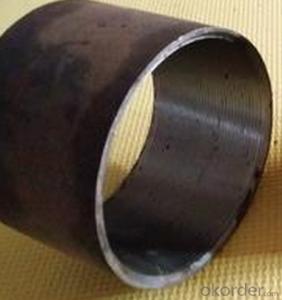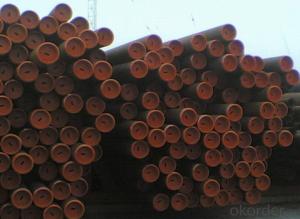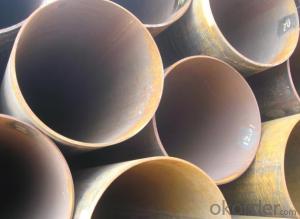1020 Carbon Seamless Steel Pipe A335 CNBM
- Loading Port:
- Qingdao
- Payment Terms:
- TT OR LC
- Min Order Qty:
- 10 pc
- Supply Capability:
- 30 pc/month
OKorder Service Pledge
OKorder Financial Service
You Might Also Like
Quick Details
| Thickness: | 1 - 40 mm | Section Shape: | Round | Outer Diameter: | 21.3 - 609.6 mm |
| Secondary Or Not: | Non-secondary | Application: | Fluid Pipe | ||
| Technique: | Hot Rolled | Certification: | BV | Surface Treatment: | Other |
| Special Pipe: | Thick Wall Pipe | Alloy Or Not: | Non-alloy | Standard: | API 5L,API |
Packaging & Delivery
| Packaging Detail: | Standard seaworthy export packing with steel strip or with plastic clothe, or as requests from the coustomer. |
| Delivery Detail: | 7-25 days after receiveved the deposit |
Specifications
Seamless Steel Pipe
Standard:API ASTM DIN
Size:OD:21.3mm-609.6mm
WT:1mm-40mm
Mechanical properties
standard | grade | Tensile strength(MPA) | yield strength(MPA) |
ASTM A106 | A | ≥330 | ≥205 |
B | ≥415 | ≥240 | |
C | ≥485 | ≥275 |
Chemical ingredients
standard | grade | Chemical ingredients | |||||||||
C | Si | Mn | P | S | Cr | Mo | Cu | Ni | V | ||
ASTM A106 | A | ≤0.25 | ≥0.10 | 0.27~0.93 | ≤0.035 | ≤0.035 | ≤0.40 | ≤0.15 | ≤0.40 | ≤0.40 | ≤0.08 |
B | ≤0.30 | ≥0.10 | 0.29~1.06 | ≤0.035 | ≤0.035 | ≤0.40 | ≤0.15 | ≤0.40 | ≤0.40 | ≤0.08 | |
C | ≤0.35 | ≥0.10 | 0.29~1.06 | ≤0.35 | ≤0.35 | ≤0.40 | ≤0.15 | ≤0.40 | ≤0.40 | ≤0.08 | |
| Company Name | Tianjin Xinlianxin | ||
| Business Type | Manufacturer and Exporter | ||
| Product | steel pipe | ||
| Main Products and Standards | |||
| product name | Specification Range | steel Grade | Executive Standard |
| Structure Pipe | 20mm-820mm 1/2"-32" | 10,20,35,45,16Mn,A53AB | GB/T8162-1999,ASTM A53-98,ASTM500-98,ASTM 500-98,JISG3441-1998,JISG3444-1994 |
| Pipe for Liquid Transportation | 20mm-820mm 1/2"-33" | 10,20,Q345(16Mn),A53AB,A192,SGP | GB/T8163-1999,ASTM A53-98,ASTM A192,JISG3452-1997 |
| Boiler Pipe | 20mm-820mm 1/2"-35" | 20,20G,A179,A106B,A192,ST37.0,ST44.0,ST35.8,ST45.8,Gr320 | GB3087-1999,GB5310-1995,ASTM A106,ASTM A179,ASTM A192,DIN-1629-1984,DIN17175,BS3059.1-1987 |
| 1 | Product | seamless steel pipe | |
| 2 | Standard | U.S.A. | ASTM A53/A106/A178/A179/A192/A210/A213/ A333/A335/A283/A135/A214/A315/A500/A501/A519/A161/A334 API 5L/5CT |
| Japan | JIS G3452/G3454/G3456/G3457/G3458/G3460/3461/3462/3464 | ||
| German | DIN 1626/17175/1629-4/2448/2391/17200 SEW680 | ||
| Britain | BS 1387/1600/1717/1640/3601/3602/3059/1775 | ||
| Russia | GOST 8732/8731/3183 | ||
| China | GB/T8162/T8163 GB5310/6579/9948 | ||
| 3 | Material Grade | U.S.A. | Gr. B/Gr.A/A179/A192/A-1/T11/T12/T22/P1/FP1/T5/4140/4130 |
| Japan | STPG38,STB30,STS38,STB33,STB42,STS49, STBA23,STPA25,STPA23,STBA20 | ||
| German | ST33,ST37,ST35,ST35.8,ST45,ST52,15Mo3, 13CrMo44, 1.0309, 1.0305, 1.0405 | ||
| Britain | Low, Medium, high | ||
| Russia | 10, 20, 35, 45, 20X | ||
| China | 10#, 20#, 16Mn, 20G, 15MoG, 15CrMo, 30CrMo, 42Crmo, 27SiMn, 20CrMo | ||
| 4 | Out Diameter | 21.3mm-609.6mm | |
| 5 | Wall Thickness | 2.31mm-40mm | |
| 6 | Length | As per customers' requirements | |
| 7 | Protection | Plastic caps/ Wooden case | |
| 8 | Surface | Black painting/varnished surface,anti-corrosion oil, galvanized or as per required by customer | |
- Q:Could you tell me what difference between SC galvanized steel pipe and MT wire pipe?
- SC is welded pipe, not galvanized pipe, RC is galvanized pipe, MT is lined pipe laying
- Q:What is the difference between steel pipe and polyethylene pipe?
- Steel pipe and polyethylene pipe are two different types of materials used for plumbing and construction purposes. The main difference between these two pipes lies in their composition and characteristics. Steel pipe is made from a combination of iron and carbon, which gives it its strength and durability. It is commonly used in applications where high pressure and heavy loads are expected, such as in industrial settings or for underground gas and oil pipelines. Steel pipe is known for its resistance to corrosion and its ability to withstand extreme temperatures. On the other hand, polyethylene pipe is a type of plastic pipe made from high-density polyethylene (HDPE) or low-density polyethylene (LDPE). It is lightweight, flexible, and easy to install, making it a popular choice for residential plumbing and irrigation systems. Polyethylene pipe is resistant to chemicals, UV rays, and abrasive materials, making it suitable for both above-ground and underground installations. Another significant difference between steel pipe and polyethylene pipe is their cost. Steel pipe generally tends to be more expensive due to the raw materials and manufacturing processes involved. Polyethylene pipe, on the other hand, is relatively affordable and cost-effective, especially for smaller-scale projects. In terms of maintenance, steel pipe requires periodic inspections and maintenance to prevent corrosion and ensure its longevity. Polyethylene pipe, on the other hand, is virtually maintenance-free due to its resistance to corrosion and chemical degradation. In summary, the main difference between steel pipe and polyethylene pipe lies in their composition, strength, durability, cost, and maintenance requirements. The choice between these two pipes depends on the specific needs of the project, taking into consideration factors such as pressure, load, budget, and environmental conditions.
- Q:What is the importance of corrosion resistance in steel pipes?
- The importance of corrosion resistance in steel pipes is significant as it helps to extend the lifespan of the pipes, ensures their structural integrity, and maintains the quality of the fluid or gas being transported. Corrosion can lead to pipe failures, leaks, and contamination of the contents, resulting in costly repairs, environmental hazards, and potential safety risks. Therefore, incorporating corrosion-resistant properties in steel pipes is crucial for their long-term performance, durability, and overall efficiency.
- Q:Are steel pipes suitable for transporting chemicals?
- Yes, steel pipes are highly suitable for transporting chemicals. This is due to their excellent resistance to corrosion and high durability, ensuring the safe and efficient transportation of various chemicals over long distances.
- Q:Can steel pipes be used for oil refinery applications?
- Yes, steel pipes can be used for oil refinery applications. Steel pipes offer many advantages for oil refinery applications including high strength, durability, and resistance to corrosion. They are able to withstand high pressure and temperature conditions that are common in oil refinery operations. Steel pipes are also easy to transport and install, making them a popular choice for oil refinery projects. Additionally, steel pipes can be customized to meet specific requirements such as size, thickness, and coating, making them suitable for a wide range of oil refinery applications.
- Q:What is the standard length of a steel pipe?
- The standard length of a steel pipe can vary depending on the application and industry, but commonly it ranges from 18 to 24 feet.
- Q:What is the typical diameter range for steel pipes?
- The typical diameter range for steel pipes varies, but it typically falls between 1/2 inch to 48 inches.
- Q:Are steel pipes suitable for use in food processing industries?
- Yes, steel pipes are suitable for use in food processing industries. Steel pipes are highly durable, resistant to corrosion, and can withstand high temperatures and pressures, making them ideal for transporting various food products and fluids. Additionally, steel pipes are easy to clean, maintain hygiene standards, and comply with food safety regulations, making them a reliable choice for the food processing industry.
- Q:What are the common welding techniques used for steel pipes?
- The common welding techniques used for steel pipes include shielded metal arc welding (SMAW), gas metal arc welding (GMAW), flux-cored arc welding (FCAW), and submerged arc welding (SAW).
- Q:Can steel pipes be used for oil transportation?
- Yes, steel pipes can be used for oil transportation. Steel pipes are commonly used in the oil and gas industry for the transportation of crude oil, petroleum products, and natural gas. They are preferred due to their strength, durability, and resistance to corrosion. Steel pipes are capable of withstanding high-pressure environments and can be used for both onshore and offshore oil transportation. Additionally, steel pipes can be welded together to form long pipelines, making them a cost-effective solution for transporting oil over long distances. Overall, steel pipes are a reliable and efficient choice for oil transportation.
1. Manufacturer Overview |
|
|---|---|
| Location | |
| Year Established | |
| Annual Output Value | |
| Main Markets | |
| Company Certifications | |
2. Manufacturer Certificates |
|
|---|---|
| a) Certification Name | |
| Range | |
| Reference | |
| Validity Period | |
3. Manufacturer Capability |
|
|---|---|
| a)Trade Capacity | |
| Nearest Port | |
| Export Percentage | |
| No.of Employees in Trade Department | |
| Language Spoken: | |
| b)Factory Information | |
| Factory Size: | |
| No. of Production Lines | |
| Contract Manufacturing | |
| Product Price Range | |
Send your message to us
1020 Carbon Seamless Steel Pipe A335 CNBM
- Loading Port:
- Qingdao
- Payment Terms:
- TT OR LC
- Min Order Qty:
- 10 pc
- Supply Capability:
- 30 pc/month
OKorder Service Pledge
OKorder Financial Service
Similar products
New products
Hot products
Related keywords






























